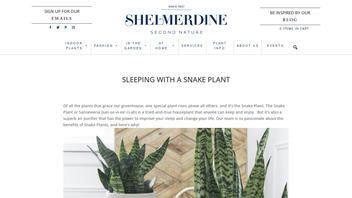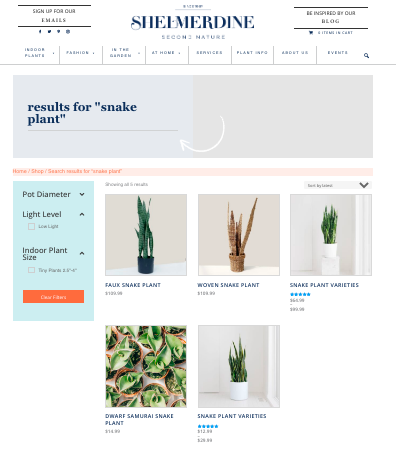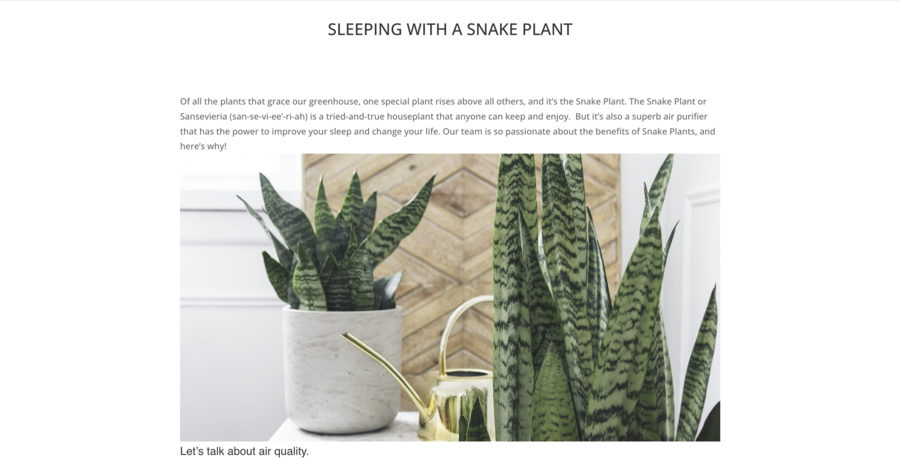
Did a NASA study find that snake plants, a type of houseplant, improve air quality in your home while you sleep? No, that's not true: A public affairs officer for NASA told Lead Stories that NASA has not made this claim and that the results taken from a 1989 study it ran on air-quality factors have been misinterpreted. A 2019 study found that a room would have to contain up to 1,000 plants in order for the plants to improve air quality. Having just a couple of plants, like many homes do, will not produce better air.
The claim about snake plants' supposed air-filtration capabilities appeared in an article (archived here) published by Shelmerdine, a gardening vendor, under the title "SLEEPING WITH A SNAKE PLANT." It opened:
Of all the plants that grace our greenhouse, one special plant rises above all others, and it's the Snake Plant.
The Encyclopedia Britannica defines snake plants as common houseplants with "yellow-striped leaves and tiny pale green scented flowers."
This is what the article about snake plants looked like at the time of the writing:
(Source: Shelmerdine.com screenshot taken on Fri May 26 15:26:16 2023 UTC)
The Shelmerdine article claims that a NASA Clean Air Study found that the snake plant produces oxygen so effectively that if a person were stuck in a sealed room with no airflow, they would be able to breathe if six to eight snake plants were present. For a non-sealed room, the article claimed, the study found that 15 to 18 "medium-to-large" snake plants would improve the air of a 1,800-square-foot home.
The Shelmerdine website itself sells snake plants, as the screenshot below shows:
(Source: Shelmerdine.com screenshot taken on Fri May 26 19:20:00 UTC 2023)
NASA public affairs officer Robert Margetta denied, in a May 26, 2023, email to Lead Stories, that the NASA study had found that snake plants purify residential air quality. The houseplants used in NASA's study were not in spaces where people would normally find themselves, he said:
NASA has not made these claims or recommendations. In 1989, a small team at NASA's Stennis Space Center in Bay St. Louis, Mississippi, published a study titled "Interior Landscape Plants for Indoor Air Pollution Abatement." The report featured findings about a dozen common houseplants' ability to remove a variety of household toxins, such as formaldehyde, from sealed chambers. The research was focused on sealed areas with limited airflow, not typical residential or commercial spaces. Since the study's publication, its findings have often been misinterpreted or misapplied. The study did not draw the conclusions made in this post.
A 2019 study from the Journal of Exposure Science & Environmental Epidemiology, a peer-reviewed academic publication that focuses on environmental impact, found that potted plants do not improve air quality. The study found that a non-sealed room would need anywhere from 10 to 1,000 potted plants to have an equal air exchange of outdoor and indoor air.
Being able to place up to 1,000 plants in a standard-sized bedroom is improbable: In the U.S., bedrooms average 132 square feet for apartments and roughly 220 square feet for houses, according to construction guides.
Additional recent Lead Stories fact checks of claims about NASA can be found here, here and here.


















